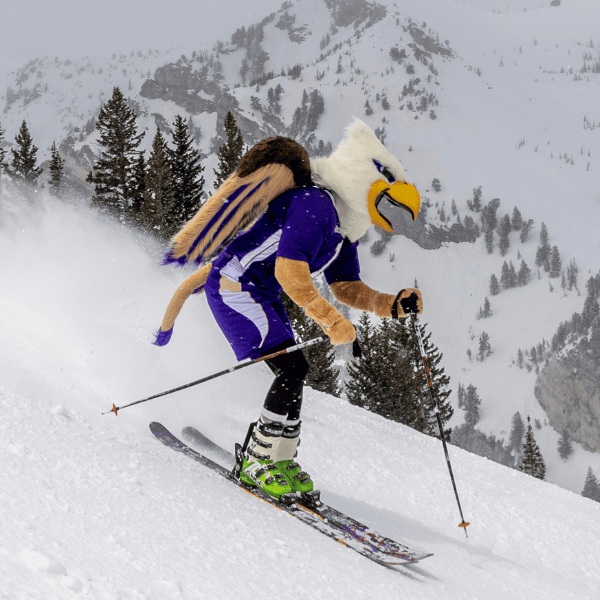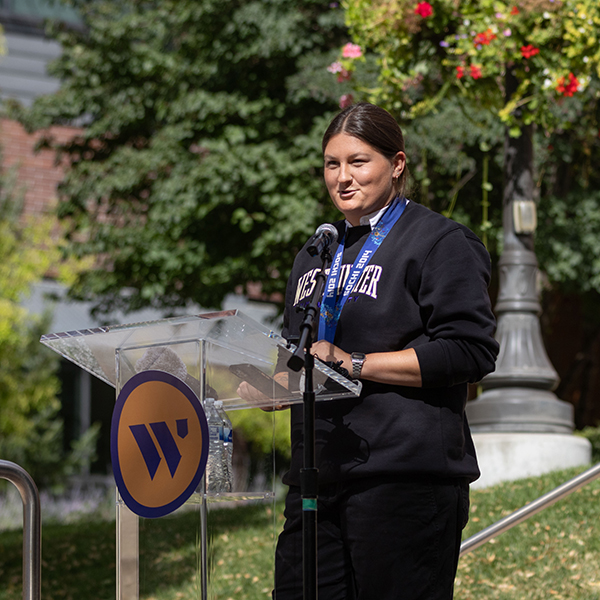
In the fall of 2023, Professor Russ Costa took students from his Cognitive Neuroscience class to Snowbird ski resort to study brain waves. Russ teaches neuroscience at Westminster, and one area of his research focuses on how high altitudes affect decision-making.
In designing research projects that have opportunities for student involvement, Russ prioritizes outdoor experiences. By doing so, he contributes to the physical and emotional wellness of Westminster students and helps them combat burnout and fatigue.
“Studies have shown that being outdoors has a positive impact on cognitive function. That’s one of the main reasons that I try to give students outdoor research opportunities like this project. Westminster’s campus is unique in that it’s located close to incredible outdoor spaces that we can incorporate into our teaching.”
Part of Russ’s inspiration for the research at Snowbird came after witnessing the increasing levels of fatigue during and after the pandemic.
“In the same way that people get tired after riding a bike, lifting weights, or running for long periods of time, fatigue can build up when people need to repeatedly make decisions. This is a concept known as decision fatigue,” Russ says. “During the pandemic, people had to make a lot of extra decisions about how they were going to respond to their situation and build new routines. This led to fatigue in the workplace and, of course, among students."
Although Russ says that research about the pandemic and related decision fatigue among students is just starting to be published, he has noticed that since the pandemic, students in his classes seem increasingly exhausted with trying to manage their classwork and other commitments.
Decision fatigue can lead to poor outcomes in the workplace and school, but it can also have serious consequences for athletes. For backcountry snowboarders or skiers, making the wrong decision in the backcountry could lead to injury or death.
One of the factors that can lead to increased decision fatigue in outdoor sports is oxygen availability. At higher altitudes, oxygen levels are decreased, which means that less oxygen is available for the brain. This can lead to poor decision-making. With this relationship between oxygen availability and decision-making in mind, Russ forged a partnership with Snowbird ski resort to examine the relationship between altitude and brain function.
Students in Russ’s Cognitive Neuroscience class measured the brain waves of student volunteers using a tool called an EEG net, which is a helmet-shaped device with sensors that can collect and record brain waves. The measurements took place at Snowbird, with an elevation of around 11,000 feet, and on Westminster’s campus, with an elevation of around 4,400 feet. The project allowed students to experience research in a new environment while contending with real-world challenges.
“Some of the challenges that we’ve faced with this project are logistical: we’ve had to work around busy student schedules and the schedules of our partners at Snowbird. Students are also learning how to use new technology and how to work with one another in a new setting,” Russ says. “These challenges are exactly what we face as researchers in the field.”
While Russ and his students are still collecting and analyzing data, Russ is curious to see how brain waves measure differently between Snowbird, with a higher altitude, and Westminster’s campus, with a lower altitude. This project will continue for years to come, giving many neuroscience students the opportunity to participate in this unique experience.


